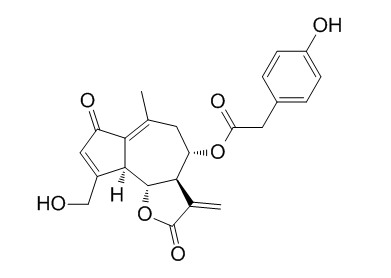Lactupicrin
Lactupicrin has antimicrobial and anti-cancer effects, it also protect the plant from insect feeding.
Inquire / Order:
manager@chemfaces.com
Technical Inquiries:
service@chemfaces.com
Tel:
+86-27-84237783
Fax:
+86-27-84254680
Address:
1 Building, No. 83, CheCheng Rd., Wuhan Economic and Technological Development Zone, Wuhan, Hubei 430056, PRC
Providing storage is as stated on the product vial and the vial is kept tightly sealed, the product can be stored for up to
24 months(2-8C).
Wherever possible, you should prepare and use solutions on the same day. However, if you need to make up stock solutions in advance, we recommend that you store the solution as aliquots in tightly sealed vials at -20C. Generally, these will be useable for up to two weeks. Before use, and prior to opening the vial we recommend that you allow your product to equilibrate to room temperature for at least 1 hour.
Need more advice on solubility, usage and handling? Please email to: service@chemfaces.com
The packaging of the product may have turned upside down during transportation, resulting in the natural compounds adhering to the neck or cap of the vial. take the vial out of its packaging and gently shake to let the compounds fall to the bottom of the vial. for liquid products, centrifuge at 200-500 RPM to gather the liquid at the bottom of the vial. try to avoid loss or contamination during handling.
RSC Advances2017, 86
BMC Pharmacol Toxicol.2018, 19(1):5
Sci Rep.2021, 11(1):14180.
Phytomedicine.2022, 102:154183.
Int J Mol Sci.2019, 20(3):E651
Molecules.2022, 27(22):7887.
Journal of Applied Biology & Biotechnology2023,11(4):148-158
Nutr Res Pract.2023, 17(4):670-681.
Evid Based Complement Alternat Med.2020, 2020:8582318.
J of Physics Conference Series2019, 1349(1)
Related and Featured Products
Phytochemistry, 1985, 24(10):2225-2231.
The role of sesquiterpene lactones and phenolics in the chemical defence of the chicory plant.[Reference:
WebLink]
METHODS AND RESULTS:
Amounts of the sesquiterpene lactones and the major phenolics were determined in the chicory plant at different times during the growing season. The levels of the sesquiterpene lactones (lactucin, Lactupicrin and 8-deoxylactucin) and the hydroxycoumarin cichoriin were found to be highest in the most actively growing regions of the plant. In two-choice and no-choice feeding experiments with borosilicate discs, 8-deoxylactucin, Lactupicrin and cichoriin significantly reduced feeding of Schistocerca gregaria at levels comparable to those present in the plant. Cichoriin was still significantly antifeedant at 0.006% dry wt, while aesculin, aesculetin and the caffeic acid ester, chicoric acid were inactive.
CONCLUSIONS:
We conclude that the three sesquiterpene lactones secreted in the latex provide a significant barrier to herbivory in chicory, although the phenolics and notably cichoriin also protect the plant from insect feeding.
Industrial Crops and Products, 2014, 60(1):52–59.
Production of guaianolides in Agrobacterium rhizogenes - transformed chicory regenerants flowering in vitro.[Reference:
WebLink]
Chicory (Cichorium intybus L.) is rich in bitter sesquiterpene lactones, mainly guaianolides: lactucin, 8-deoxylactucin, Lactupicrin and their 11(S),13-dihydroderivatives—compounds recognized for their antimicrobial and anti-cancer effects. In vitro plant tissue culture, and particularly Agrobacterium rhizogenes—generated hairy root (HR) cultures, have many advantages as systems for production of valuable secondary metabolites. Although chicory HRs grow better than control culture, having nearly 60 times greater fresh weight gain, they do not contain a higher content of guaianolides than wild type (wt) roots.
METHODS AND RESULTS:
Thus we have established in vitro system comprised of wt root and HR cultures, and wt and transformed regenerated plants of the same age, in rosette and flowering stage, in order to study the effects of transformation, organogenesis and flowering on guaianolides production. Both regeneration and flowering in vitro were spontaneous, so the results were not influenced by exogenous growth regulators. Some of the transformed clones grew better, but all flowered earlier in comparison to wt plants. Floral transition increased guaianolides content in both roots and leaves of transformed, but not of wt plants. Expression of RolC oncogene correlated with floral transition and with guaianolides accumulation.
CONCLUSIONS:
We propose A. rhizogenes—transformed plants at the flowering stage as an alternative source of free guaianolides, where, in contrast to HRs, entire plants can be used for the extraction.



